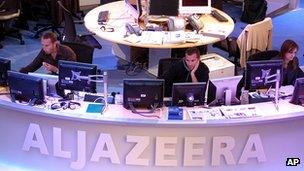Al Jazeera sees its model copied
- Published

The broadcaster Al Jazeera is celebrating.
It is 15 years this month since it launched the original Al Jazeera Arabic channel, and five years since its English-language network brought its coverage to the centre of Washington and other western capitals.
The station was once accused of "peddling lies" by the former US defence secretary Donald Rumsfeld, but Al Jazeera is now credited with playing a crucial role in the Arab Spring.
It's not the only global TV channel changing the world view of politics.
As Hillary Clinton, the US Secretary of State, told the Senate Foreign Affairs Committee earlier this year: "We are in an information war - and we are losing that war.
"Al Jazeera is winning. The Chinese have opened up a global English-language and multi-language television network. The Russians have opened up an English-language network. I've seen it in a few countries and it's quite instructive."
Al Jazeera wouldn't thank Hillary Clinton for bracketing it with the state television services of China and Russia.
Though owned by the government of Qatar, and now headed by a member of the Qatari royal family, it insists it's an independent broadcaster.
Al Anstey, chief executive of Al Jazeera English, trained at CBS News and was head of foreign news at ITN.
He says Al Jazeera Arabic was set up with similar ambitions - "aiming at the Arab-speaking audience across the Middle East, as truth-telling in a very troubled region that was dominated by state-controller broadcasters, often mouthpieces of their own government.
"Al Jazeera English was started up in order to put that philosophy on the global stage."
Al Jazeera rose to prominence after 9/11, during the US air strikes on Afghanistan, when it was the only network allowed to report from there and the first to broadcast recorded statements by Osama Bin Laden.
In 2004, the then US defence secretary Donald Rumsfeld expressed his anger. "What Al Jazeera is doing is vicious, inaccurate and inexcusable" he said.
But earlier this year, interviewed on Al Jazeera English by Sir David Frost, he had changed his tune.
"The audience has grown and it can be an important means of communication in the world and I'm delighted you're doing what you're doing" he said.
"I'm delighted to be doing it" replied Sir David.
The former director of Global News at the BBC, Richard Sambrook, is now global vice chairman of the Edelman PR agency.
He says Al Jazeera does a good job maintaining its independence and played a crucial role in its coverage of the Arab Spring.
"Al Jazeera was a very important platform… through the first part of this year, particularly around the protests in Egypt, for reflecting what was happening on the ground, as against state television particularly in Egypt and other countries as well, which was refusing to accept the full depth of what was happening."
Now, as Hillary Clinton observed, more global services are launching in the English language, such as Russia Today. Often they look - and sound - very much like their western counterparts.
The state-run China Central Television is opening new studios in Washington and, according to some reports, has plans for Europe too.
Sambrook says that, as technology costs come down, more countries want a voice in the global dialogue, and they have different editorial values from, say, the BBC or CNN.
"There's no question that Press TV is trying to push the voice of Iran, for example.
"Russia Today is absolutely representing a Russian perspective, France 24 was set up to represent France's voice in the international arena, and of course Al Jazeera is very open about representing the voiceless and the Arab street into this global dialogue."
Whether the other channels will have as much impact over the next 15 years remains to be seen.